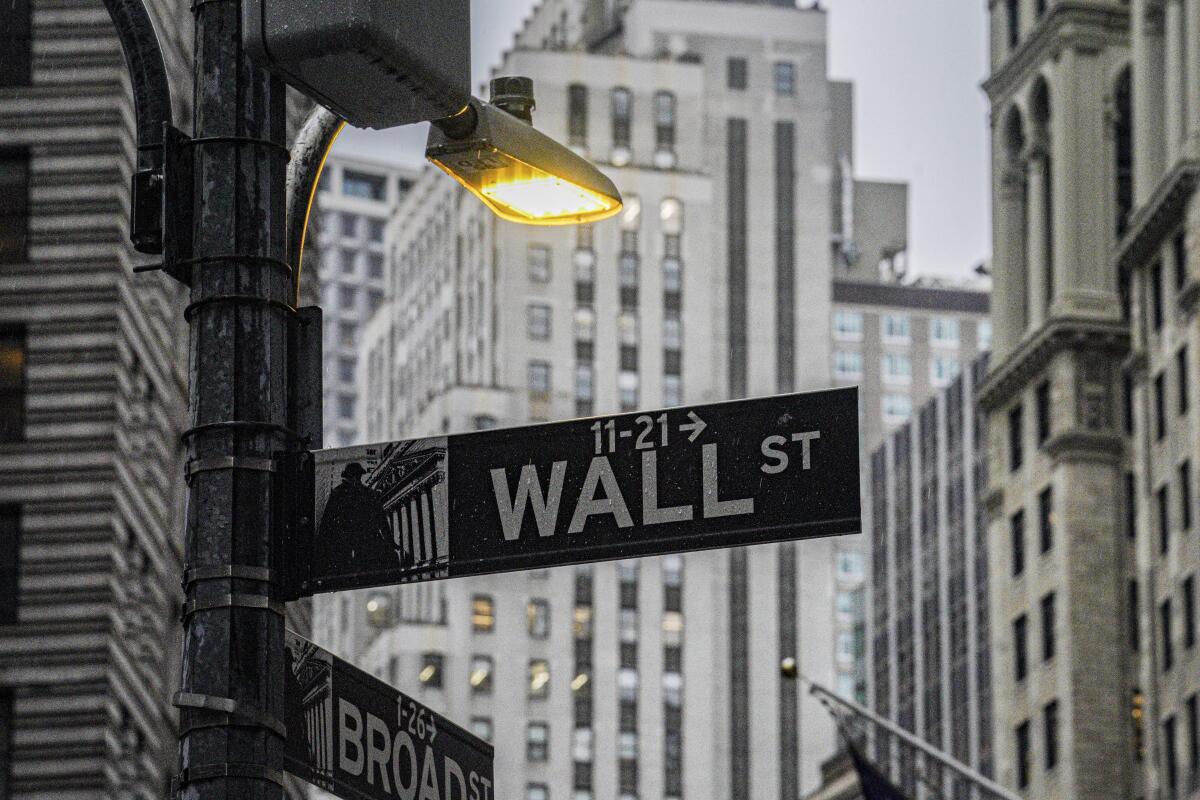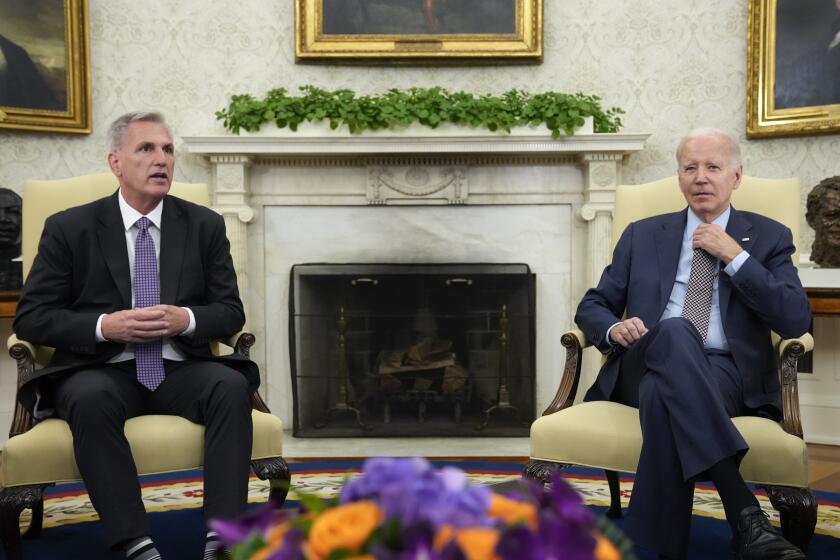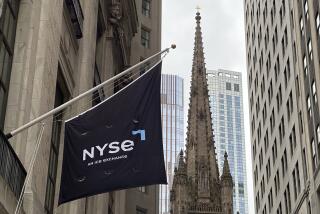Wall Street slides as debt worries worsen

Wall Street slid Tuesday as the U.S. government crept closer to the edge of a potentially disastrous default on its debt.
The Standard & Poor’s 500 index fell 1.1% after House Speaker Kevin McCarthy (R-Bakersfield) said, “We’re not there yet” on a deal to prevent the U.S. government from running out of cash. That followed a meeting late Monday that he and President Biden called productive but that ended with no agreement.
The Dow Jones industrial average dropped 0.7%, while the Nasdaq composite lost 1.3%.
Until now, the stock market has remained largely resilient even as Washington approached a June 1 deadline. That’s when the U.S. government may no longer be able to pay its bills unless Congress allows it to borrow more. Economists and investors widely believe a default would send shockwaves through the global economy and financial markets.
President Biden and House Speaker Kevin McCarthy say they and their lead negotiators have had a productive meeting on the impasse over the government’s debt ceiling.
The assumption on Wall Street has been that Congress will reach a deal at the 11th hour, as it’s already done several times before, because the alternative simply seems too dire for anyone to allow.
But a worry on Wall Street is that Washington may not feel urgency to act until financial markets shake hard enough to put pressure on politicians in both parties.
“There’s a theory that neither one looks like a hero until there is that scare of cascading prices,” said Keith Buchanan, senior portfolio manager at Globalt Investments. “One party or both can seem like white knights.”
Portions of Wall Street have shown more concern, particularly in the bond market, where some Treasury bills are supposed to get repaid around the date of a possible default. Prices for those bonds have fallen, in part because of the debt ceiling worries, which in turn has pushed up their yields.
But the stock market hasn’t shown as much concern. Buchanan said that may be because it’s difficult to know how prices across different markets would react to something that’s never happened before and was once unthinkable.
He said he hasn’t made any moves to investments he oversees because of fears of a default, at least not yet.
“I think everyone’s taking it moment by moment,” he said. “Every minute that goes by raises the urgency.”
The worries about the debt ceiling are coming on top of concerns that the slowing economy may already be heading for a recession. A preliminary report released Tuesday morning suggested the economy remains split, with growth for travel and other service businesses strengthening while manufacturing remains under pressure.
If the debt crisis roiling Washington were eventually to send the United States crashing into recession, America’s economy would hardly sink alone.
“The U.S. economic expansion gathered further momentum in May, but an increasing dichotomy is evident,” said Chris Williamson, chief business economist at S&P Global Market Intelligence.
On Wall Street, AutoZone dropped 6% after reporting weaker growth in revenue for the latest quarter than analysts expected. It pointed to a slower-than-expected March.
Electric vehicle maker Lordstown Motors fell 5.3% to 28 cents after it announced a reverse stock split in order to boost its share price. Investors will get one new share for every 15 they currently hold. Its stock has remained below $1 since mid-March.
On the winning side of Wall Street was Lowe’s, which rose 1.7% after reporting stronger profit and revenue for the latest quarter than analysts expected. But it also cut its financial forecasts for the year partly because of lower-than-expected sales to do-it-yourself customers.
Retailers are among the last companies to report their results for the first three months of the year, and most companies have been beating expectations. Retailers in particular have gotten lots of attention because resilient spending by U.S. households has been one of the main positives keeping the economy out of a recession.
Manufacturing and other areas of the economy are struggling under the weight of much higher interest rates meant to get inflation under control.
High interest rates have also meant stress for the U.S. banking system. Three high-profile bank failures since March have rattled the system, and Wall Street has been on the lookout for the next bank that could suffer a debilitating drop in confidence by its customers.
Some of the heaviest scrutiny has been on PacWest Bancorp, but it rallied for a second day after announcing the sale of a $2.6-billion portfolio of real estate construction loans. It rose 7.9% after jumping 19.5% on Monday.
Other banks also strengthened, including a 4.6% jump for Zions Bancorp.
All told, the S&P 500 lost 47.05 points to close at 4,145.58. The Dow dropped 231.07 points to 33,055.51, and the Nasdaq fell 160.53 points to 12,560.25.
In the bond market, the 10-year Treasury yield ticked down to 3.70% from 3.72% late Monday. It helps set rates for mortgages and other important loans.
The two-year yield, which moves more on expectations for the Fed, inched up to 4.34% from 4.32% late Monday.
Most stock markets abroad fell, including a 1.3% drop for Paris and a 1.5% slide for Shanghai.
AP writers Matt Ott and Joe McDonald contributed to this report.
More to Read
Inside the business of entertainment
The Wide Shot brings you news, analysis and insights on everything from streaming wars to production — and what it all means for the future.
You may occasionally receive promotional content from the Los Angeles Times.












